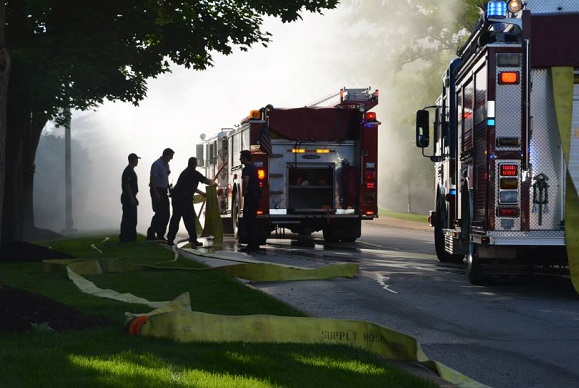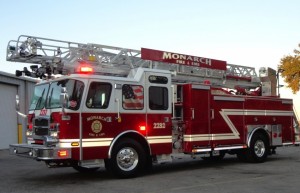
As the April 7 election for a board member at the Monarch Fire Protection District approaches, fire fighters and paramedics, members of Fire Fighters Local 2665, are sure of one thing:
They seek a Board of Directors whose leadership will set aside a controversial history of budget overages, petty politics, grandstanding, misinformation, reprimands and verbal attacks on the men and women who risk their lives every day to fight fires, save lives and protect property.
They want board leaders to serve the community with honesty, integrity, dignity and transparency in their own actions and decision-making.
In recent years the board’s activities, led by President Robin Harris and Secretary Jane Cunningham, have resulted in a budget overage of $725,000, including attorneys’ fees of $230,000 paid to attorneys who contributed to Harris and Cunningham’s previous board election campaigns.
Recently, the board was criticized for delaying much-needed repairs of fire protection equipment and facilities, including a rescue boat, but instead acquired bulletproof vests for the three Board members to be used during its public meetings even though armed police officers guard the boardroom.
In December 2014, Sean T. Porter, a decorated battalion chief who rose through the ranks in a respected 35-year career at the department, was unexpectedly terminated without being given any official reason for the dismissal by the Monarch Board of Directors.
Also last year, respected Fire Chief Tom Vineyard, plus a battalion chief and an assistance chief, all resigned within a period of six months, citing board controversy.
These actions and others have generated taxpayer outrage and a great deal of public criticism for questionable management, including from the St. Louis Post-Dispatch, The Labor Tribune, and other media.
NEGATIVE OUTCOMES
 As a result of these detrimental board actions, serious problems have developed within the Monarch Fire Protection District. A few examples:
As a result of these detrimental board actions, serious problems have developed within the Monarch Fire Protection District. A few examples:
• Morale: morale among fire fighters and paramedics is low as a result of poor leadership and constant battles where the board majority keeps trying to distort the truth about the fire fighters’ issues, and to portray them as “bad guys.”
• Turnover: experienced fire firefighters and paramedics have quit the department for jobs in more stable departments, despite Harris’ public claim that Monarch firefighters and paramedics are among the highest paid in the nation – when in fact they are not.
• Punishment: Harris and Cunningham often chastise Monarch firefighters whenever they answer a question about board activities. Last year, the board suspended Fire Captain/Shop Steward Chris Gelven for two days without pay after Gelven responded to media questions about the board acquiring those used bullet-proof vests.
• Staffing: In December 2013, Harris and Cunningham eliminated the Public Education Officer position held by Ray Antonacci, an 11-year veteran of the department, leaving a gap in safety outreach services for school children, senior citizens and local businesses.
ELECTION SOLUTION?
 Cunningham was elected to a six-year term on the board in April 2013, but Harris’ term is expiring and he is running for re-election on the April 7 ballot. Harris is a strident anti-worker board member who has been accused of using the district’s official newsletter to support his own campaign with political messages.
Cunningham was elected to a six-year term on the board in April 2013, but Harris’ term is expiring and he is running for re-election on the April 7 ballot. Harris is a strident anti-worker board member who has been accused of using the district’s official newsletter to support his own campaign with political messages.
Harris’ opposing candidate is a woman, Kelley Miller, who is an experienced human resources professional affiliated with Missouri Baptist Medical Center. She has exceptional skills in relationship building, strong analytical skills, consistent application of practices and policies, and solid values of respect and accountability. Her specialties include recruiting; benefits, compliance, and employee relations.
A REASON FOR CHANGE
The anti-union attitude of two of the three members of the Monarch Fire Protection District board of directors has cost the district’s taxpayers a fortune in legal fees
Since 2005 the district has been involved in two major disputes with the fire fighters and lost both, costing not only tens of thousands of dollars in legal fees, but a $400,000 judgment against the district in a major discrimination case won by four women fire fighters.
But the taxpayers’ are not done paying through the nose; the district is appealing both cases that will incur many thousands of dollars more in legal fees.
CRUCIAL APRIL 7 ELECTION
Whether or not the district’s wasteful spending of tax dollars will continue hinges in great measure on the April 7 election where Harris is running for re-election.
“The April 7 election is crucial to the taxpayers of the Monarch District,” said Andy Stecko, a Monarch shop steward and Fire Fighters 2665’s 3rd District vice president
“They will either vote for a director – Kelley Miller – who wants to serve our community with integrity by demanding fiscal responsibility while keeping our community safe, or for a director – Robin Harris – who is hell bent on costing the taxpayers more money by trying to break our union.
“Our union is not officially supporting any Monarch candidate either way. We want a board member who will be honest in their representation of voters and taxpayers, and who will show more respect for our union and the work we do without constantly trying to criticize or reprimand or sanction our team members.
“And that board member needs to be a better steward of taxpayer dollars than the current board leadership,” Stecko added.
FIRE FIGHTERS DOING THEIR PART
 During all this turmoil and despite Harris and Cunningham’s efforts to demonize the district’s fire fighters and paramedics as the “bad guys,” those same fire fighters and paramedics have cooperated in times of fiscal stress by freezing their salaries or negotiating wage cuts.
During all this turmoil and despite Harris and Cunningham’s efforts to demonize the district’s fire fighters and paramedics as the “bad guys,” those same fire fighters and paramedics have cooperated in times of fiscal stress by freezing their salaries or negotiating wage cuts.
In 2010, they negotiated a 2.4 percent cut; in 2004, a 2.5 percent cut, and in 2003, a 2.5 percent cut. From 2003 to 2009, there was only a half-percent increase in wages negotiated with the district.
“When the board has been willing to meet us halfway and have a reasonable discussion over issues, we’ve always responded in a way that benefitted the taxpayers, homeowners and the entire community we are pledged to serve, and do so proudly,” added Stecko.

